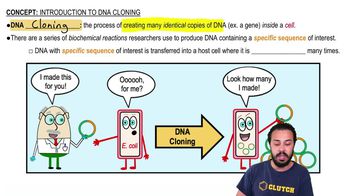Introduction to DNA Cloning quiz Flashcards
 Back
BackIntroduction to DNA Cloning quiz
1/15
Terms in this set (15)
- What is recombinant DNA?Recombinant DNA is a molecule that contains DNA from two different sources, often from different species.
- What role do bacterial plasmids play in DNA cloning?Bacterial plasmids are small, circular DNA molecules that can be used as cloning vectors to carry a gene of interest into a host cell.
- What is a cloning vector?A cloning vector is a molecule, such as a plasmid, that can carry foreign DNA into a host cell.
- What are the two general steps in DNA cloning?The two general steps in DNA cloning are creating the recombinant DNA molecule and transforming the DNA molecule into a host cell.
- What enzyme is used to cut DNA during the creation of recombinant DNA?Restriction enzymes are used to cut DNA during the creation of recombinant DNA.
- What is the function of DNA ligase in DNA cloning?DNA ligase is an enzyme that pastes or seals together DNA fragments to form a recombinant DNA molecule.
- What is transformation in the context of DNA cloning?Transformation is the process of allowing a bacterial cell to uptake external recombinant DNA.
- How can recombinant DNA be used in a host cell?Recombinant DNA can be used to carry a gene of interest into a host cell, where it can be replicated and expressed.
- What is the significance of the gene of interest in DNA cloning?The gene of interest is the specific gene that scientists want to clone and express in a host cell.
- What is the role of bacterial host cells in DNA cloning?Bacterial host cells uptake recombinant DNA and replicate it, allowing for the production of the gene of interest.
- What is the purpose of using a cloning vector in genetic experiments?The purpose of using a cloning vector is to introduce and replicate foreign DNA within a host cell.
- What is the first step in creating recombinant DNA?The first step in creating recombinant DNA is cutting the DNA using restriction enzymes.
- What does the term 'ligation' refer to in DNA cloning?Ligation refers to the process of pasting or sealing DNA fragments together using DNA ligase.
- What is the outcome of successful DNA transformation in bacteria?The outcome is that the bacteria will contain and replicate the recombinant DNA, producing the gene of interest.
- Why are restriction enzymes compared to molecular scissors?Restriction enzymes are compared to molecular scissors because they cut DNA at specific sites, similar to how scissors cut paper.


